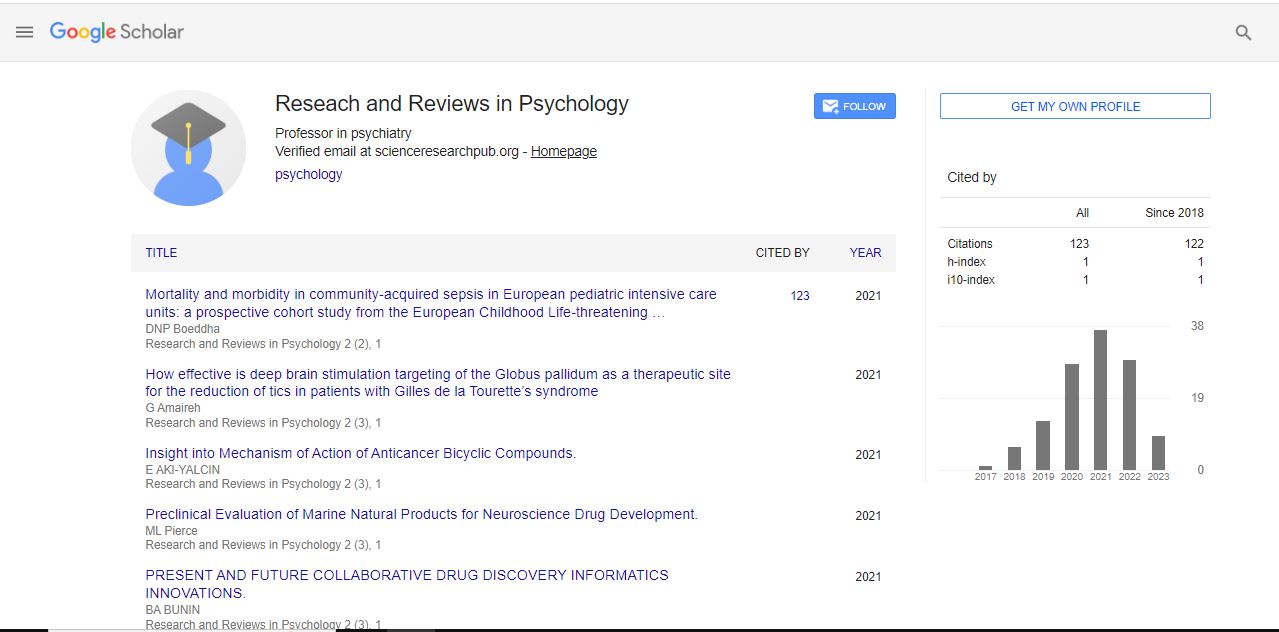Commentary, Res Rev Phys Vol: 4 Issue: 4
Innovative Approaches in Neuropsychology: Optimizing Recovery Outcomes
Eija Keijo*
1Department of Neurology and Rehabilitation, National University of Distance Education, Bravo Murillo, Spain
*Corresponding Author: Eija Keijo,
Department of Neurology and Rehabilitation, National University of Distance
Education, Bravo Murillo, Spain
E-mail: keijo.eija@nude.edu.es
Received date: 28 November, 2023, Manuscript No. RRPY-23-124313;
Editor assigned date: 30 November, 2023, Pre QC No. RRPY-23-124313 (PQ);
Reviewed date: 15 December, 2023, QC No. RRPY-23-124313;
Revised date: 22 December, 2023, Manuscript No. RRPY-23-124313 (R);
Published date: 29 December, 2023, DOI: 10.4192/rrpy.1000356
Citation: Keijo E (2023) Innovative Approaches in Neuropsychology: Optimizing Recovery Outcomes. Res Rev Phys 4:4.
Description
Neuropsychological rehabilitation is a dynamic field that aims to restore, enhance, or compensate for cognitive and behavioral deficits resulting from brain injury or neurological disorders. The process involves a comprehensive assessment of cognitive functions followed by targeted interventions tailored to the individual's specific needs. "Assessment and Intervention in Neuropsychological Rehabilitation" navigates the intricate landscape of understanding, evaluating, and treating cognitive impairments, emphasizing the collaborative efforts of neuropsychologists, healthcare professionals, and individuals undergoing rehabilitation. A person-centered approach acknowledges the uniqueness of each individual undergoing rehabilitation. Assessment results inform the development of personalized intervention plans that address specific cognitive strengths, challenges, and goals, fostering a sense of autonomy and engagement in the rehabilitation process.
Goal setting is a collaborative process involving the individual, their family, and the rehabilitation team. Establishing realistic and meaningful goals provides a roadmap for intervention, creating a sense of purpose and motivation throughout the rehabilitation journey. Memory deficits are common in neurological conditions. Memory rehabilitation interventions may include compensatory strategies (e.g., using memory aids), cognitive training exercises, and the development of routines to enhance memory recall and retention. Attention and executive functions, such as planning and problem-solving, are vital for daily functioning. Interventions involve targeted exercises, cognitive strategies, and real-world applications to improve attentional control and executive skills. Neurological conditions often impact emotional regulation. Interventions focus on teaching individuals effective emotion regulation strategies, enhancing emotional awareness, and fostering adaptive coping mechanisms to navigate the emotional challenges associated with rehabilitation. Behavioral interventions address abnormal behaviors that may arise due to neurological conditions. Applied behavior analysis techniques, positive reinforcement strategies, and environmental modifications contribute to behavior management, promoting adaptive behaviors and reducing challenges. Neuropsychological rehabilitation is inherently multidisciplinary. Collaborative efforts involve neuropsychologists, occupational therapists, speech-language pathologists, physical therapists, social workers, and other healthcare professionals. Regular communication and coordination ensure a holistic and cohesive approach to rehabilitation. The involvement of family members is integral to the rehabilitation process.
Technological advancements offer a range of assistive devices to support individuals in their rehabilitation journey. Cognitive aids, mobile applications, and adaptive technologies can enhance independence and compensate for specific cognitive deficits. Modifying the physical environment to accommodate cognitive impairments is a key aspect of rehabilitation. Simple adjustments, such as organizing spaces and reducing distractions, contribute to creating an environment that supports optimal cognitive functioning. The ultimate aim of neuropsychological rehabilitation is often community reintegration. Intervention plans include goals related to social participation, community engagement, and the restoration of vocational or educational roles, promoting a meaningful and fulfilling life after injury. For individuals seeking to return to work or education, vocational rehabilitation programs offer tailored support. Vocational assessments, skills training, and workplace accommodations contribute to successful transitions back into professional or academic settings.
Ongoing assessment of progress is crucial in neuropsychological rehabilitation. Regular check-ins, reassessments, and feedback from both the individual and the rehabilitation team guide adjustments to the intervention plan, ensuring its relevance and effectiveness. Flexibility is a hallmark of effective rehabilitation. As individuals progress, intervention strategies may need to evolve. The ability to adapt and modify interventions based on changing needs and goals contributes to the dynamic nature of neuropsychological rehabilitation. Respecting the autonomy of individuals undergoing rehabilitation involves obtaining informed consent. This includes providing clear information about assessment procedures, intervention options, and potential risks and benefits. Safeguarding the confidentiality and privacy of individuals is paramount. Ethical guidelines dictate secure handling of sensitive information, ensuring that personal and medical details are protected throughout the rehabilitation process. Sustaining gains made during rehabilitation poses a challenge. Long-term follow-up and the development of strategies for ongoing maintenance are essential considerations in the field. The integration of emerging technologies, such as virtual reality and neurofeedback, holds promise for advancing neuropsychological rehabilitation. These innovations offer new avenues for personalized and engaging interventions.
This commentry encapsulates the intricacies of a field dedicated to restoring cognitive function and enhancing the lives of individuals impacted by neurological conditions. From the initial assessment process to the implementation of personalized interventions, the journey involves collaboration, adaptability, and a commitment to the holistic well-being of an individual. As advancements in neuroscience, technology, and rehabilitation strategies continue, the field is poised to address new challenges and pave the way for innovative approaches that optimize recovery outcomes and promote a meaningful life postinjury.
 Spanish
Spanish  Chinese
Chinese  Russian
Russian  German
German  French
French  Japanese
Japanese  Portuguese
Portuguese  Hindi
Hindi 